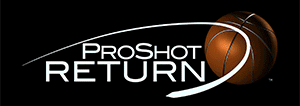Basketball Rebounder
5 of the Biggest Basketball Shooting Mistakes (And How to Fix Them) - By Joe Haefner
For most of these fixes, you are going to need to start away from the hoop and take hundreds and thousands of shots. You can find a wall and do this by yourself or find a line and shoot it back and forth to a partner. Once you begin to feel comfortable with your adjustment, take hundreds of shots really close to the basket and gradually move out.
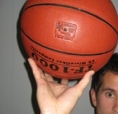 Players often have the ball sit on the tip of their thumb on their shooting hand. This position is awkward and forces the body to strain to hold the proper shooting form. In order to be a good shooter, you have to be comfortable.
Players often have the ball sit on the tip of their thumb on their shooting hand. This position is awkward and forces the body to strain to hold the proper shooting form. In order to be a good shooter, you have to be comfortable. It you don't strain, your elbow sticks too far out.
How do you fix it?
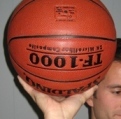 You need to have the ball rest on the side of the thumb rather than on the tip of the thumb on every shot. It may feel awkward at first, but it will help tremendously and more of your shots will travel to the dead-center of the rim. If you can not determine when you are doing this, you may need to have someone critique your shot or video tape it.
You need to have the ball rest on the side of the thumb rather than on the tip of the thumb on every shot. It may feel awkward at first, but it will help tremendously and more of your shots will travel to the dead-center of the rim. If you can not determine when you are doing this, you may need to have someone critique your shot or video tape it. 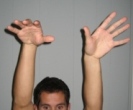 Some players flick the ball with their thumb on the guide hand when shooting the basketball. This will cause serious problems for the shooter and the ball will often spray left and right. It's tough enough to judge the distance, yet add another factor of left and right into the equation.
Some players flick the ball with their thumb on the guide hand when shooting the basketball. This will cause serious problems for the shooter and the ball will often spray left and right. It's tough enough to judge the distance, yet add another factor of left and right into the equation. Most players develop this problem when they are too weak to get the ball to the rim, and the habit carries through their teenage and adult years.
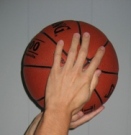 How do you fix it?
How do you fix it? You can squeeze your thumb against the index finger on your guide hand. This will not let you shoot the ball with the thumb. If the problem still continues, take your guide hand off of the ball by about a half-inch and shoot with one hand. Make sure your guide hand stays still.
You can also use a shooting strap to keep your guide hand and thumb still. This is a very effective way to break this habit and keep your guide hand from moving. We have found the j-strap is very effective and recommend it to solve this problem.
These jerky movements can cause you to become an inconsistent shooter:
- Twisting the body.
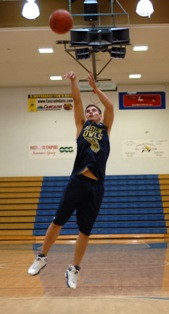
- Fading backwards, and to the left or right.
How do you fix it?
You need to evaluate when this jerky movement is happening and what type of jerky movement is occurring. This may mean you need to video tape your shot if you have nobody to help.
Two major reasons players twist their body when they shoot is:
- Their feet are not aligned correctly.
- They bring their guide hand down too early.
Make sure your feet line up correctly before every shot. This means you may need to pivot more as you receive the pass or as you step into your shot off the dribble. If you use a hop, make sure that you are turning enough while in the air to align your feet properly as you land. If your feet are not set correctly, this will force your body to twist while shooting to try to compensate for it.
If you bring your guide hand down too early, it brings extra movement into your shot that causes you to twist your body. If you don't believe me, sit in your chair and shoot with one hand and bring your guide hand down to your waist at the same time. What naturally happens? Your torso will twist.
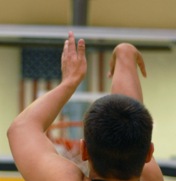 That's why it is important to keep your guide hand extended in the correct position.
That's why it is important to keep your guide hand extended in the correct position. Pro players use this method to stop their upper-body from twisting when they take shots when they are off-balance or their feet are not aligned appropriately. It helps keep their upper body from twisting during the shot. I do NOT advise for players under the age of 18 to practice this shot, because it can mess up your mechanics.
A good way to stop leaning is to step towards the basket on the catch. This brings your momentum towards the basket rather than fading or leaning.
You may also have analyzed when the player starts to jerk their body or lean in a certain direction. The player may only do a jerky movement when dribbling to the left and pulling up for a jumper. If this happens, they need to take hundreds and thousands of repetitions doing that same type of shot with great shooting form.
If you are missing a lot of shots because you have a flat shot or you don't seem to get many shooter's bounces, it could be because you are flinging your wrist or have a flat shot.
You can check to see if you have this problem by bringing the ball to your set point and then bringing it straight down. If your shooting-hand lands on top of your head (or the back of your head) instead of grazing your forehead, then you've got a bad set point.
How do you fix it?
Move the ball forward so that when you bring it straight down, the back of your shooting hand grazes your forehead. Practice shooting to yourself from this position until it becomes your new set point.
You should reinforce your new set point by daily form shooting close to the basket. In fact, you should rebuild your shot slowly by stepping back one step at a time as you establish consistency from a given range, using the new set point.
Players who shoot past the top of their jump will often develop a hitch and jerky shot. The same with players who try to jump as high as they can on every shot.
A player should focus on shooting before the top of their jump for a few different reasons:
- Quicker release. If you shoot before the top of your release, it gives the defender less time to recover to defend the shot.
- Make more shots. The shot is fluid which results in a smoother and softer shot because you don't stop the shot motion at any point in your shot.
- Longer range. If you shoot at or after the top of your shot, it takes a lot more upper body strength to get the ball to the rim. If you shoot as you are going up, the momentum from your legs help carry the ball a lot farther. Try shooting away from the hoop when doing this.
How do you fix it?
This one is pretty simple. You need thousands of repetitions shooting the basketball before the top of your jump.
In order to fix any of these problems, you are going to have be persistent and focused. "Sometimes, you have to take two steps backwards, to take three steps forwards." What that means is that your shot will most likely become worse before it gets better. Always keep the long-term in perspective. Who cares if you don't shoot the ball well during summer league, if you'll be able to shoot lights out once basketball season rolls around!
